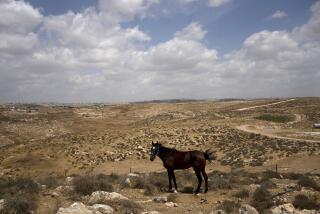Palestinians Say Plans by Israel Threaten Peace
- Share via
BETHLEHEM, West Bank — Enraged Palestinian leaders said Tuesday that if Israel forges ahead with newly announced plans to build two major highways in the occupied West Bank and encourages expansion of Jewish settlements on disputed territory, it could doom the Middle East peace process.
At a meeting of the Palestinian Legislative Council, members of the 4-month-old elected body repeatedly threatened a withdrawal from peace talks in the face of any renewed building drive by the Likud-led government of Israeli Prime Minister Benjamin Netanyahu.
The legislators were smarting from an announcement Monday by Minister of Infrastructure Ariel Sharon of the Israeli government’s first major road project: two highways in the West Bank to be built at an estimated cost of $50 million.
The Palestinians also were irate about a meeting Monday between Netanyahu and leaders of the settler movement--a meeting they interpreted as a nod and a wink for increasing settlement activity.
Although Netanyahu made no explicit promises to lift restrictions on settlements imposed over the last four years by the previous, Labor-led governments of Shimon Peres and Yitzhak Rabin, he called Labor’s past policies “unreasonable” and said they will be reviewed.
The 88-member Palestinian council--holding a two-day session devoted to the issue of Jewish settlements, particularly around Jerusalem--heard warnings from its own experts armed with maps and diagrams outlining construction.
“If they are going to escalate the settlements . . . it means that they are going to bury the peace process,” Palestinian Justice Minister Freih abu Medeen was quoted by news services as saying. Council member Ziad Abuzayyad observed: “We started the peace process with the aim of ending the occupation--enabling us to have our own state or at least our own entity. But if settlements and road building continue, there will be no room.”
Sharon said one of the two planned highways would lead from the West Bank into northern Jerusalem, while the second would link central Israel with Jewish settlements inside the West Bank. The roads would pass through rural areas handed over to nominal Palestinian control last year but where Israel has retained overall responsibility for security.
Netanyahu’s emerging policy appears to be to tighten Jewish claims on the West Bank--the biblical lands of Judea and Samaria plus East Jerusalem, all conquered by Israel during the 1967 Middle East War--through a gradual expansion of existing sites.
Even under the Labor governments, the Jewish population in the occupied territories grew by 40%--partly from a natural increase but mainly because of completion of 10,000 housing units that were under construction when Labor came to power.
Rabin and Peres put a freeze on new housing except in the immediate vicinity of Jerusalem. But they did build a network of Israeli-controlled bypass roads to link the settlements.
The Israeli newspaper Haaretz, citing government sources, said Netanyahu has approved in principle the growth of existing settlements and gradual expansion of housing along the new bypass routes. It said such growth in the next few years could increase the Jewish population of the West Bank from 140,000 to 190,000, compared with 1.2 million Palestinians.
In his inaugural speech to the Israeli parliament last month, Netanyahu called the settlers “the real pioneers of our day [who] deserve support and appreciation.” At the same time, analysts believe he wants to avoid further antagonizing his Arab partners and especially the United States, which considers any increase in settlements an obstacle to peace.
More to Read
Sign up for Essential California
The most important California stories and recommendations in your inbox every morning.
You may occasionally receive promotional content from the Los Angeles Times.













